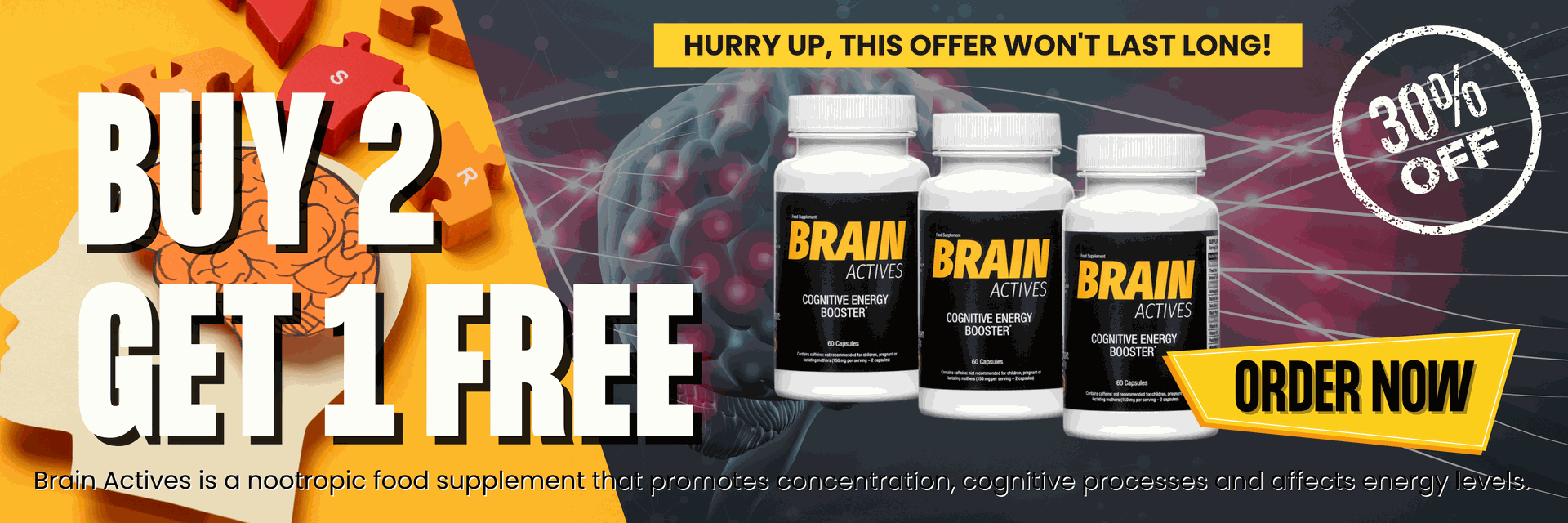In today’s fast-paced world, where information is constantly flowing and the demands on our attention are higher than ever, having sharp memory and the ability to concentrate aren’t just advantages—they’re essential skills. Whether you're a student juggling assignments, an athlete pushing your body and mind to the limit, or a professional managing high levels of stress and responsibility, maintaining mental clarity and cognitive function is key to success.
However, with the constant bombardment of distractions and the pressures of modern life, it can often seem difficult to stay focused and retain important information. Fortunately, there are proven strategies and effective supplements that can help improve these cognitive abilities, allowing you to perform better, think more clearly, and retain knowledge more easily.
In this article, we’ll dive into the best ways to enhance memory and focus, covering practical lifestyle habits, dietary tips, and natural supplements scientifically proven to boost brain performance. Whether you’re looking to improve your work performance, excel in an exam, or stay mentally sharp as you age, these strategies will help you maintain peak mental capacity.

How to Improve Your Memory
1. Proper Sleep Habits
Sleep is critical for brain health, as it’s during this time that the brain processes and consolidates information learned throughout the day, which is essential for long-term memory. Lack of sleep, or poor-quality sleep, can negatively impact attention, alertness, and overall cognitive performance. In fact, sleep deprivation is linked to greater difficulty in retaining new information, affecting both students and professionals.
The National Sleep Foundation recommends establishing a regular sleep routine, ideally sleeping 7 to 9 hours per night for adults, and creating a restful environment: dark, quiet, and cool. A study published in Nature Reviews Neuroscience showed that memory consolidation occurs during specific sleep stages, such as deep sleep (slow-wave sleep) and REM sleep, emphasizing the importance of sleep quality.
2. Regular Exercise
Physical activity not only improves overall physical health but also increases blood flow to the brain, promoting the release of neurotrophic factors like brain-derived neurotrophic factor (BDNF), a protein that supports neuron survival, brain plasticity, and cell growth. This positively impacts memory and cognitive functions.
A study published in Neuroscience & Biobehavioral Reviews concluded that regular exercise, particularly aerobic activities like walking, swimming, or cycling, can improve spatial and verbal memory. Moreover, exercise has been found to be effective in preventing age-related cognitive decline, reducing the risk of diseases such as Alzheimer’s.
3. Healthy Diet
A balanced diet, rich in antioxidants, healthy fats, and nutrients, is key to maintaining a healthy brain. Foods such as fish (especially those rich in omega-3 fatty acids like salmon), fruits, and vegetables can protect the brain from oxidative stress and promote neuroplasticity, the process by which the brain adapts and forms new neural connections.
According to a study published in the American Journal of Clinical Nutrition, a diet rich in foods like nuts, berries, and leafy greens can significantly reduce the risk of cognitive decline. Additionally, omega-3 fatty acids, particularly DHA, are key components in the structure of brain cell membranes and have been linked to improvements in memory.

4. Reduce Added Sugar Intake
Excessive consumption of added sugar can have a negative impact on brain function. Research has shown that diets high in sugar are associated with an increased risk of cognitive impairment and memory problems. Sugar can negatively affect brain synapses and reduce the ability to form new neural connections, a process essential for learning and memory.
A study conducted on animals and published in Neuroscience found that high-fructose diets contribute to a decline in brain plasticity and memory. Reducing sugar consumption, especially processed sugars, can help stabilize blood glucose levels and, in turn, improve memory and focus.
5. Maintain a Moderate Weight
Obesity is associated with an increased risk of chronic inflammation and metabolic diseases, such as type 2 diabetes, which can negatively affect brain health. Inflammation in the body can also damage brain cells and impair cognitive functions, including memory and focus.
A study published in The Lancet Public Health showed that maintaining a healthy weight through balanced eating and regular exercise is linked to better cognitive function and a lower likelihood of developing dementia as you age.
6. Consume Alcohol in Moderation
Excessive alcohol consumption can damage brain cells and impair memory, in addition to increasing the risk of developing long-term cognitive disorders. However, some studies suggest that moderate alcohol consumption, particularly red wine, may have protective effects due to the presence of antioxidants like resveratrol.
A study published in Frontiers in Neuroscience showed that moderate red wine consumption (one glass per day for women and up to two for men) could be associated with a lower risk of cognitive decline, but excessive drinking should be avoided to prevent negative effects on brain health.
7. Training the Brain
Mental stimulation is crucial for maintaining cognitive sharpness as we age. Activities like learning a new language, solving puzzles, playing strategy games, or participating in music classes can help improve memory and keep the brain active. These activities challenge the brain, promote neuroplasticity, and allow neurons to form new connections and networks, enhancing cognitive ability.
In addition to the methods mentioned, there are other techniques and activities that can help you train your brain effectively:
- Active Reading: Regularly reading, especially challenging material, forces the brain to process new information, stimulating memory and concentration. Reading books that require deep analysis or texts that demand interpretation enhances cognitive skills and strengthens neural connections.
- Regular Writing: Writing daily, whether it’s journaling, articles, or even short stories, helps organize thoughts, structure ideas, and improve both memory and creativity. Active writing engages multiple areas of the brain, increasing its plasticity.
- Playing a Musical Instrument: Learning to play an instrument is not only a physical challenge but also improves auditory memory and motor coordination. A study in Frontiers in Neuroscience showed that musicians have more structured brains and better memory capabilities, as music requires the combination of auditory patterns and precise movements.
- Learning a New Skill: Engaging in activities that push you out of your comfort zone, such as gardening, photography, or woodworking, forces the brain to form new connections. Learning a new skill strengthens the hippocampus, the region of the brain responsible for memory.
- Mental Training Games: There are apps and programs specifically designed to train memory and improve brain processing speed. Games like Lumosity, Elevate, or Peak are backed by research showing that repeated cognitive exercises can improve mental skills in specific areas, such as working memory and problem-solving.
- Memory Exercises: Simple exercises like memorizing word or number lists, practicing photographic memory, or reciting information (e.g., remembering the names of presidents or capitals of countries) help train both short-term and long-term memory.
- Meditation and Visualization: Visualization meditation, along with mindfulness, helps train concentration and memory by focusing the mind on detailed mental images or scenarios. Visualizing something specific, like a natural setting or a positive memory, trains the brain to focus on complex details.
- Math or Science Classes: Revisiting topics in science or math, even at basic levels, can be extremely useful in stimulating the logical and analytical part of the brain. Solving math problems, analyzing experiments, or understanding scientific concepts increases reasoning skills and strengthens working memory.
A study in the Journal of Experimental Psychology showed that people who regularly engage in this type of cognitive training demonstrate significant improvements in memory, attention, and learning capacity. As the brain adapts to new challenges, it maintains its flexibility, which is key to preserving cognitive abilities as we age.

Supplements to Improve Memory and Focus
- Theacrine (Kucha tea leaf extract) Theacrine is a natural compound found in kucha tea. It has been shown to improve mental energy and focus without the typical side effects of caffeine. A study published in Frontiers in Pharmacology indicates that it can enhance mental clarity and focus, making it an ideal supplement for those seeking a cognitive boost without the anxiety associated with other stimulants.
- Caffeine Caffeine is one of the most popular supplements for improving attention and short-term memory. Research has shown that caffeine can boost cognitive performance in tasks requiring sustained attention. However, it is essential to consume it in moderation to avoid negative effects such as anxiety and insomnia. The Cochrane Library has reviewed multiple studies demonstrating its benefits for mental sharpness.
- Rhodiola Rosea This adaptogen helps reduce fatigue and improves cognitive function under stress. A study in Phytotherapy Research suggests that Rhodiola can enhance mental resilience and improve cognitive performance in high-pressure situations, making it a valuable ally for students and professionals.
- Bacopa Monnieri Bacopa is known for its ability to improve long-term memory. An analysis of several studies in Psychological Bulletin concluded that Bacopa extract significantly enhances information retention and learning. Its effects may be more pronounced in older adults but also benefit younger individuals looking to improve academic performance.
- Gotu Kola (Centella Asiatica) This extract has been used in traditional medicine for its cognitive benefits. Studies suggest it can help improve memory and reduce anxiety. A study in the Journal of Ethnopharmacology highlights that Gotu Kola may have neuroprotective effects and improve cerebral circulation.
- Turmeric Turmeric, with its primary active compound curcumin, has gained attention for its anti-inflammatory and antioxidant properties. Studies have shown that curcumin can boost the production of brain-derived neurotrophic factor (BDNF), essential for brain health. A study in the American Journal of Geriatric Psychiatry suggests curcumin can improve memory in older adults.
- Ginkgo Biloba Ginkgo Biloba is traditionally used to improve blood circulation and, consequently, cognitive function. Research in the Cochrane Database of Systematic Reviews has shown that it can have positive effects on memory and focus, particularly in older adults. However, its use is also being explored in young adults seeking to enhance academic and work performance.
- B-Complex Vitamins
- Vitamin B6 and B12: Crucial for brain health, these vitamins are involved in neurotransmitter production, which regulates mood and memory. A study in the Journal of Alzheimer's Disease shows that adequate B12 levels can improve memory in older adults.
- Pantothenic Acid: Important for energy production in the brain, it also plays a role in neurotransmitter formation. Deficiency can affect mood and memory.
Magnesium Magnesium is vital for brain function, and supplementation has been shown to improve memory and cognitive function. Research indicates that adequate magnesium levels are associated with a lower risk of cognitive decline. A study in Nature Reviews Neuroscience highlights that magnesium can influence synaptic plasticity and memory.


What Is the Best Supplement for Memory and Focus?
The combination of several of these supplements may offer optimal results. However, the best solution may vary from person to person. It is advisable to consult a healthcare professional before starting any supplement regimen, especially if you have pre-existing medical conditions or are taking other medications.
In Summary…
Memory and focus are skills that not only affect our academic or professional performance but also impact our overall quality of life. Imagine tackling every task with clarity and energy, feeling that every moment counts. The good news is that you have the power to transform your cognitive abilities and overall well-being.

Now is the time to take charge of your mental health. Start by making small changes to your daily routine: establish healthy sleep habits, adopt a nutrient-rich diet, and engage in activities that stimulate your mind. The key is consistency and being proactive. Don’t underestimate the impact that a mindful approach can have on your daily performance.
If you feel you need an extra boost, consider supplements as a tool to help you reach your goals. Research, get informed, and, if necessary, consult with a professional to guide you through the process. The decision to improve your memory and focus is a personal journey, and every step counts.
Don’t wait any longer: take control of your life and unlock your potential. The future is in your hands!